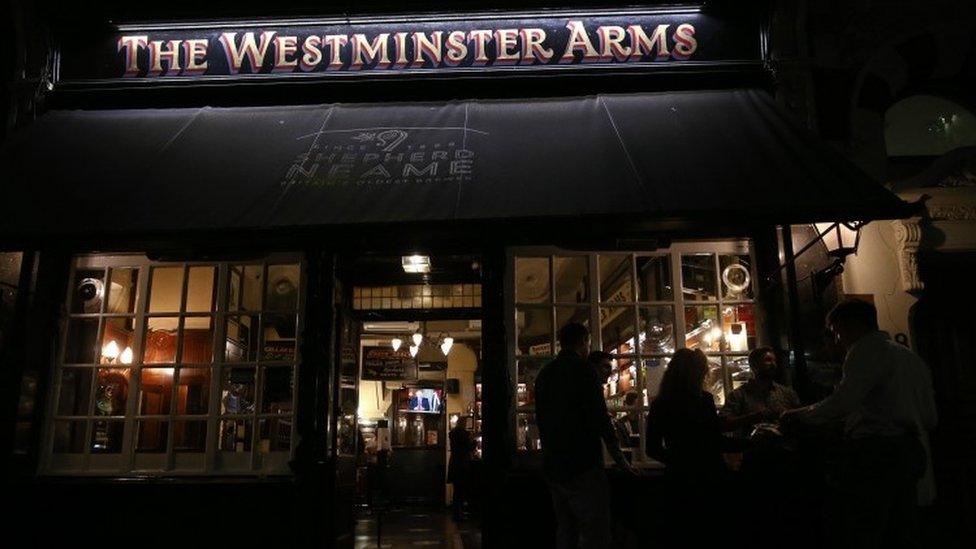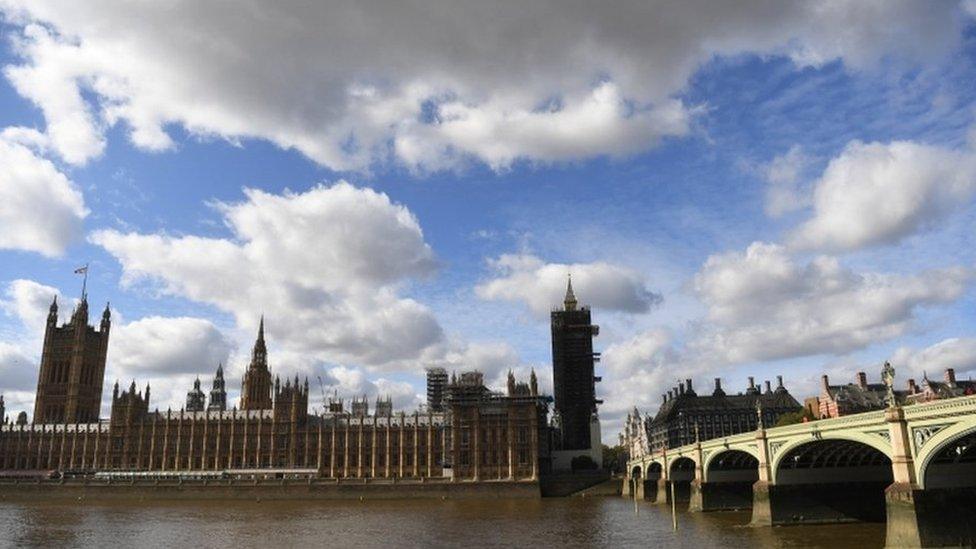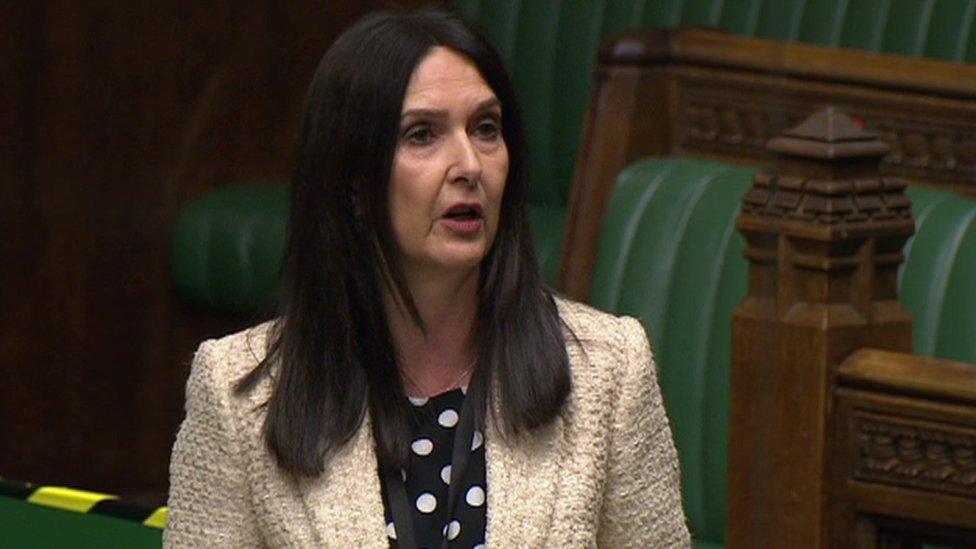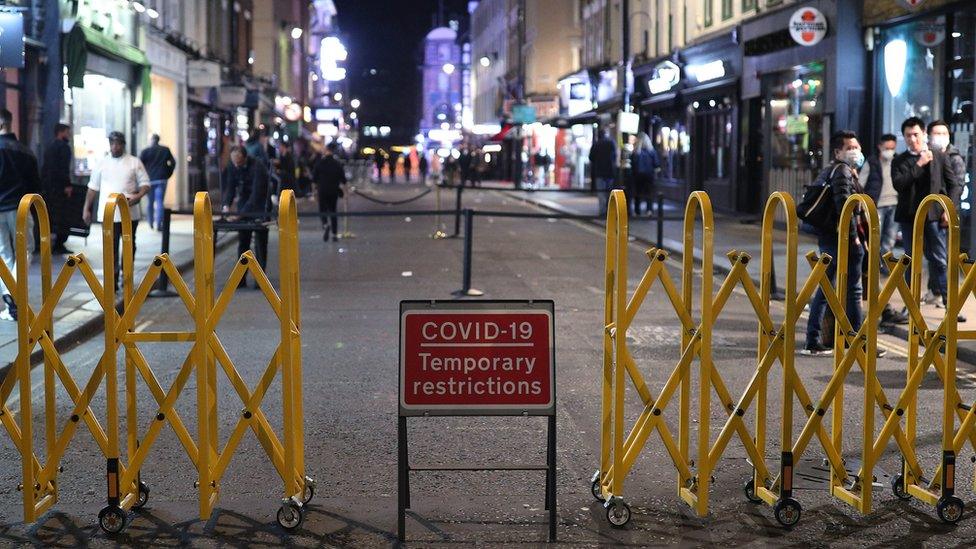The week ahead in Parliament
- Published

With talk of a major initiative to curb the spread of Covid-19, any government announcement will dominate events in Parliament in the coming days, and possibly overshadow gathering concerns that really major restrictions are not being debated in the Commons before coming into force.
As I write, nothing has been confirmed, but it is worth noting that the Commons agenda for Monday looks rather light, leaving room for a ministerial statement and even a debate and vote on the rumoured three tier restrictions being worked up by the government. If there is a statement, look out for South Yorkshire metro mayor Dan Jarvis - the only big city mayor who remains an MP - who might have a thing or two to say.
Here's my pick of five things to look out for next week:
Covid regulations rebellion on Tuesday? Twice this week, health ministers have been given a torrid time by Tory backbenchers as they sought Commons approval for assorted pandemic regulation. And while the numbers involved in the rebellion on Tuesday over the "Rule of Six" regulations looked insignificant, the MPs involved (1922 Chairman Sir Graham Brady headlined) and the number of abstentions on the government side should have sent a shudder through the whips. It may be overshadowed by bigger announcements, but this vote will be on the 22:00 closing time rules, which are even less popular with Tory MPs, so look out for some move to compromise or mollify. But remember, this argument looks increasingly like a proxy for the wider issue of whether an entirely new pandemic strategy is needed.
Lords fury over skeletons. Skeletons in this context are bills which just give ministers power to do whatever they want later on, by making regulations now. So the bill in question gives little clue as to the underlying policies, which means Parliament doesn't get a chance to sound off about the objectives ministers then pursue. This according to three Lords Committee chairs, who wrote to the government to protest, is a Bad Thing. Which brings us to Wednesday's committee stage of the Medicines and Medical Devices Bill (14:30), and some serious pushback by some serious peers. The Lib Dem Lord Sharkey, backed up by the Conservative Lord Forsyth, Labour, and the Convenor of the Crossbenchers, Lord Judge, have put down an amendment which would put sincere parliamentary scrutiny onto any regulations made under the Bill in a warning shot to ministers.
CHIS-y fit? CHIS is the Covert Human Intelligence Sources Bill, which aims to provide a legal framework for policing of security service infiltrators into groups that the powers that be want to keep an eye on - what if they have to commit a crime to prove themselves to the group? CHIS provides the mechanism to authorise that, but it's a subject that makes some people queasy. Detailed scrutiny is coming up on Thursday, so watch out for amendments from all quarters, including from the Intelligence and Security Committee who've taken the highly unusual step of putting down an amendment to require that they get an annual report on CHIS matters.
How much is that doggy in the window? This week's wagging tail belongs to Conservative MP and noted dog-lover Andrew Rosindell - his Dogs and Domestic Animals Accommodation Bill seeks to assert a tenants right to keep a pet, and is the latest of a series of pet-friendly 10 minute rule bills from backbench Tories. See also James Daly's bill from a couple of weeks ago to enact two pet-friendly measures, "Tuk's Law" and "Gizmo's Law".
The loneliness of the long-distance minister. Spare a thought for Lord Bethell - the Department of Health's man in the Lords, who has been a near permanent fixture in the Upper House as Peers endlessly debate those coronavirus statutory instruments, and anything to do with the pandemic, not to mention that Medicines and Medical Devices Bill, and more than occasional questions from peers on health issues. Kinder noble Lords think he deserves a deputy, and even the government's detractors have been impressed by his Stakhanovite work rate.
Monday 12 October
MPs resume business (14:30) with an hour of Education Questions, followed by any ministerial statements or urgent questions. A prime ministerial statement on new coronavirus restrictions has been heavily trailed for this week, and absent that, the day's main business looks suspiciously light.
The main scheduled event is consideration of Lords amendments to the Agriculture Bill - the measure to create a post Brexit framework for farming subsidies, replacing the Common Agricultural Policy. And there are quite a lot of Lords amendments; on powers to safeguard UK food standards (aimed at imports which don't meet UK production and welfare standards), on climate change targets, on pesticides and on a national food strategy. There's talk of a Conservative backbench rebellion, but expect most of the Lords amendments to be rejected, and for the Bill to be sent back to peers minus most of the additions. With a similar process of parliamentary ping pong due on a number of other bills, this will be an interesting test of the mettle of the Upper House.
In Westminster Hall, the Petitions Committee has scheduled a debate on petitions on exams during Covid-19 (16:30) and calling for sanctions on China over its treatment of the Uyghur Muslim population (18:00).
On the committee corridor, Human Rights (14:30) has a session on Judicial Review and enforcing human rights with a series of legal experts, culminating in evidence from Lord Dyson, the former Master of the Rolls, the second most senior judge in England and Wales, and Supreme Court Justice. Public Accounts (14.30) questions senior officials at Cabinet Office about the Ventilator Challenge - the emergency drive to procure medical ventilators at the start of the pandemic; did it demonstrate that the system is too hidebound and that cumbersome procurement rules can be abandoned, or was it a one-off case of having to move fast in an emergency, with few wider lessons?
In the Lords (13:00) two more new arrivals are introduced - Lord Sharpe of Epsom - Chairman of the National Conservative Convention and Deputy Chairman of the Board, and Mark Lancaster a former Treasury, Armed Forces Minister, who takes his seat as Lord Lancaster of Kimbolton.
Questions to ministers range across support for people who are over 60 and should therefore be treated as vulnerable to Covid-19 according the World Health Organisation, people who have to work because because they do not have a pension, enhancing lesbian, gay, bisexual and trans rights internationally, protection of civilians in Armed Conflict, and protecting third party sellers from the dominance of Amazon.
Then peers will wave through the third reading of the Immigration and Social Security Co-ordination (EU Withdrawal) Bill, complete with seven amendments opposed by ministers, on matters ranging from family reunion rights to the treatment of victims of modern slavery. Expect more ping-pong with the Commons on this.
Then it's on to three sets of pandemic statutory instruments - the Health Protection (Coronavirus, Restrictions) (North East of England) Regulations 2020 (1010); Health Protection (Coronavirus, Restrictions) (North East of England) (Amendment) Regulations 2020 (1012); Health Protection (Coronavirus, Restrictions) (Protected Areas and Linked Childcare Households) (Amendment) Regulations 2020. As I write the speakers lists for these are rather modest and no-one has put down a regret motion, so they don't look too controversial.
Tuesday 13 October
MPs open (11:30) with Foreign Office Questions. The day's Ten Minute Rule Bill, from Labour's Emma Lewell-Buck, is on requiring schools to provide breakfast club facilities.
The main legislative action is on the remaining stages of the Fisheries Bill. Labour has amendments requiring 65 per cent of seafood caught in English waters should be landed in English ports, and to include a sustainability goal in fishing policy, there are lots of SNP amendments to ensure fisheries powers are devolved to the Scottish government. The Lib Dems have amendments on safety enforcement powers.
Then MPs debate the motion to approve (retrospectively) the Health Protection (Coronavirus, Restrictions) (No.2) (England) (Amendment) (No.5) Regulations (AKA the 22:00 curfew), before moving on to a general debate on Covid-19.
In Westminster Hall (09:30) there's an intriguing debate on a policy issue - introducing a universal basic income - which is gaining some traction on the Left. The sponsors are an interesting lot, the SNP's Work and Pensions spokesperson, Neil Gray, Labour's Clive Lewis, and former Lib Dem leadership contender Layla Moran.
In Committee-land, Public Administration and Constitutional Affairs (09:30) takes evidence on the role and status of the Prime Minister's Office
In the Lords (12:00) the latest new arrivals on the conveyer belt are Baroness (Kate) Hoey and Lord Moore of Etchingham, the former Telegraph and Spectator editor, Charles Moore.
Question time ranges across evictions of tenants who lost income due to coronavirus, changes to divorce procedure, and the effectiveness of the Housing Delivery Test - the annual measurement of housing delivery in an area covered by a local plan.
Later, peers turn to second reading of the Social Security (Up-rating of Benefits) Bill - as a money bill, this is likely to be a fairly perfunctory debate, but watch out for the maiden speech of Lord Field of Birkenhead, the artist formerly known as Work and Pensions Select Committee Chair, Frank Field.

Wednesday 14 October
MPs open (11:30) with half an hour of Wales questions, followed at midday by Prime Minister's Question Time
The day's Ten Minute Rule Bill, proposed by Conservative MP and noted dog-lover Andrew Rosindell is the Dogs and Domestic Animals (Accommodation and Protection) Bill, which seeks to establish a right for people to keep dogs and other animals in rented homes.
That is followed by two Labour Opposition Day debates on fire and re-hire tactics, and on coronavirus contracts and public procurement.
My Westminster Hall pick (09:30) is SNP superlawyer Joanna Cherry's debate on the Lord Chancellor's oath and the rule of law - an attempt to put pressure on the Lord Chancellor, Robert Buckland, over the now-famous "specific and limited" breaking of international law which would be facilitated by the UK Internal Markets Bill. It's always fun when QCs take to the barricades.
On the Committee Corridor Digital, Culture, Media and Sport has a session with Secretary of State Oliver Dowden (14:30)
In the Lords (12:00) ministers face questions on Rolls-Royce's plans to transfer the manufacture of wide-chord fan blades to Singapore, protecting people from pension and ending rotational burning of peat moorlands.
Then peers turn to Commons amendments to the Extradition (Provisional Arrest) Bill, followed by the Health Protection (Coronavirus, Restrictions) (Self-Isolation) (England) Regulations 2020, which came into force on September 28th and which impose requirements on people who are notified that they are legally required to self-isolate, as well as setting out the fines for breaking the rules.
Thursday 15 October
MPs begin their day (09:30) with 40 minutes of Environment, Food and Rural Affairs Questions, followed by mini-question times for the MPs who speak on behalf of the Church Commissioners, the House of Commons Commission and Parliamentary Works Sponsor Body, the Public Accounts Commission and the Speaker's Committee on the Electoral Commission.
Then comes the weekly Business Statement from the Leader of the House, Jacob Rees-Mogg, before MPs work on the detail of the Covert Human Intelligence Sources (Criminal Conduct) Bill.
In Westminster Hall the SNP's Dr Lisa Cameron leads a debate on a disability inclusive Covid-19 response (13:30) and the Conservative Harriett Baldwin has a debate on the June massacres in Sudan and the UK's support for Sudan's democratic transition (15:00)
On the committee corridor, Environmental Audit (09:30) takes evidence on the energy efficiency of existing homes, Public Accounts (10:00) recalls the top bods at the Department for Transport to ponder recent policy developments - what is Covid-19 doing to the transport system? Public Administration and Constitutional Affairs (14:30) continues its look at the work of the Cabinet Office with Cabinet Secretary and Head of the Home Civil Service, Simon Case and Permanent Secretary at the Cabinet Office, Alex Chisholm.
In the Lords (12.00) questions range across equal access for low and middle income countries to any future coronavirus vaccine, assistance for humanitarian, development and girls education work in Afghanistan, after the withdrawal of peacekeeping forces and a report by the Social Mobility Commission: "The long shadow of deprivation".
Then Peers whiz through the third reading of the Parliamentary Constituencies Bill - another measure which has seen five government defeats, before moving on to committee stage consideration of the Trade Bill (no votes are expected at this point, but this is another bill where the government will face serious attempts to amend).
Friday 16 October
It's another Private Members' Bill Friday in the Commons (09:30) starting with the Second Reading of the Conservative Laura Trott's Botulinum Toxin and Cosmetic Fillers (Children) Bill - which seeks to ban under-18s from having Botox treatment. That's followed by the Second Reading of the Prisons (Substance Testing) Bill proposed by the ex-cabinet minister, Cheryl Gillan.
The vibe is that both these bills will be put to a vote and sent on for detailed scrutiny. This will leave time for Conservative former chief whip Andrew Mitchell to get a Second Reading for his Registers of Births and Deaths Bill which would bring in online registration of births, marriages and deaths.
There are, as ever at this stage of the process, plenty more bills on the agenda - not least the Lib Dem Leader Ed Davey's Coronavirus Inquiry Bill. But unless some of the other business collapses, time will run out before they can be debated.
- Published2 October 2020

- Published30 September 2020

- Published18 March 2020

